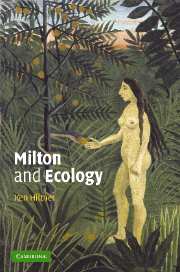Preface
Published online by Cambridge University Press: 15 December 2009
Summary
Why consider the role of place in Milton's poetry? A few years ago, while attending a seminar conducted by Diane McColley on the relation of nature to culture in the literary history of the natural world, I found myself returning again and again to the same question: what happens when culture is privileged over place? No mere academic question, as the last acres of the place my family had farmed for generations had given way to bulldozers the year before, I found myself feeling that I had somehow lost my place in the world. What was most startling about this development was the total disregard for the place: the great homogenizing culture of late twentieth-century America had seen my family's farm as merely space in which to develop itself. In order to make this “space” into the current suburban dream, nearly every aspect of the landscape was altered, with whole lakes appearing overnight. That this space developed was once a remarkably self-contained place, which offered food, fuel, water, shelter, and life, was lost with the place.
In one sense, the answer to my question of what happens when culture is privileged over place was appallingly clear: if a human culture has enough resolve, technology, and belief in its destiny, it can literally landscape every last feature of a place to conform to its vision of itself. To such a culture – to what is now our culture – place is all but irrelevant.
- Type
- Chapter
- Information
- Milton and Ecology , pp. vii - xPublisher: Cambridge University PressPrint publication year: 2003



